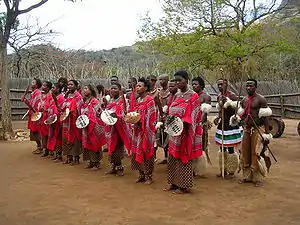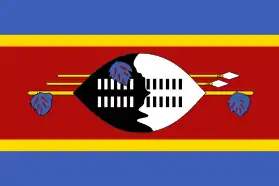Tourism in Eswatini
Tourism in Eswatini is a successful industry. Most of the tourists who visit Eswatini arrive by road from South Africa. Eswatini's tourism industry developed during the apartheid era in South Africa and this shaped many of its distinctive attractions. Since the end of apartheid, Eswatini has emphasized its traditional culture as a tourist attraction.

Apartheid era
The adoption of apartheid in South Africa and civil war in Mozambique contributed to Eswatini's appeal as an alternative tourist destination in Southern Africa. This led to growth in Eswatini's tourism industry from the 1960s to the 1990s.[1] During the apartheid era in South Africa, Eswatini drew many visitors by adopting different policies than South Africa. Many tourists visited Eswatini during that time in order to watch television programs or sporting events that they could not view in South Africa.[2] During apartheid in South Africa, Eswatini also legalized gambling in order to draw tourists what brought significant economic prosperity.[3]

The number of tourists visiting Eswatini increased from 89,015 in 1972 to 257,997 in 1989. In 1988 tourism was 3% of the GDP of Eswatini and more than 4% of its total exports. Although the traditional Monarchy of Eswatini has often been cited as a factor that attracts tourists, tourism has also been credited with causing modernization in Eswatini.[2] Although the increases in tourism seen in Eswatini have been alleged to have caused an increase in prostitution, there is no evidence that prostitution was a factor in the growth of the Eswatini tourism industry. The increase in tourism did cause the centers of prostitution in Eswatini to shift from mining areas to hotels.[4]
Post-apartheid
After the end of apartheid in South Africa and conclusion of the Mozambican Civil War made its neighbors more appealing tourism destinations, the growth of the tourism industry in Eswatini decreased. Many of the tourists who visit Eswatini are traveling between Mozambique and South Africa. Most tourists only stay for one night and many visitors only take day trips to the country.[1]
Due to the lack of other major industries, tourism is viewed by many in Eswatini as a potential source for future economic growth.[5] Since its establishment in 2003, the Eswatini Tourism Board has emphasized the fact that Eswatini is the last sub-Saharan African monarchy. Royal celebrations such as the Incwala Kingship festival are viewed as potential venues for greater tourism growth. They have also attempted to attract tourists to the game parks of Swaziland.[1] In 2006 Eswatini signed on to the Lubombo Route agreement along with South Africa and Mozambique. The agreement allowed tourists to travel across the three countries with a single visa.[6]
Arrivals by country
Most visitors arriving to Eswatini were from the following countries of nationality:[7]
| Country | 2016 | 2015 | 2014 |
|---|---|---|---|
| 814,220 | 810,249 | 856,492 | |
| 202,042 | 181,271 | 219,555 | |
| 49,295 | 69,467 | 58,624 | |
| 22,895 | 21,510 | 21,669 | |
| 21,253 | 19,360 | 14,152 | |
| 20,750 | 17,414 | 17,874 | |
| 18,014 | 17,988 | 17,359 | |
| 15,503 | 14,646 | 15,813 | |
| 7,450 | 5,216 | 4,242 | |
| 6,867 | 5,145 | 5,031 | |
| 6,610 | 6,047 | 6,720 | |
| 5,969 | 5,833 | 5,913 | |
| 5,682 | 5,092 | 5,554 | |
| 5,659 | 6,311 | 5,718 | |
| Total | 1,278,587 | 1,255,901 | 1,324,621 |
References
- Hall, James (14 April 2004). "Swazi tourism looks to the future". Mail & Guardian. Johannesburg. Retrieved 26 April 2011.
- Harrison, David (1992). "Tradition, modernity and tourism in Swaziland". Tourism and the less developed countries. Belhaven Press: 148–162.
- Helmut Wachowiak (2006). Tourism and borders: contemporary issues, policies, and international research. Burlington: Ashgate Publishing, Ltd. p. 256. ISBN 978-0-7546-4775-1.
- Harrison, David (1994). "Tourism and prostitution: sleeping with the enemy? : The case of Swaziland". Tourism Management. Elsevier. 15 (6): 435–443. doi:10.1016/0261-5177(94)90064-7.
- Brown, Tara (8 October 2006). "The king and I: King Mswati The Third". 60 Minutes. Nine Network. Retrieved 26 April 2011.
- Meyer, Jani (7 May 2006). "SA signs tourism pact with Mozambique". The Independent Online. Retrieved 25 April 2011.
